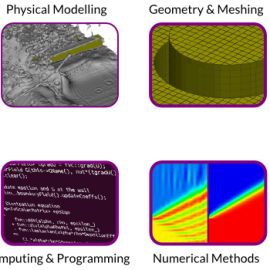In 2008, the Directors of CFD Direct began the first significant OpenFOAM Training courses. The training was written for early adopters of OpenFOAM at a time when OpenFOAM was far less functional than today. The courses largely emphasised how OpenFOAM worked and a lot of time was devoted to code customisation. We pioneered a convenient method of providing participants with a running version of OpenFOAM using a persistent live installation that booted Linux from an 8GB USB pendrive. The wider user community benefited from our example cases, e.g. the motorbike case, and code changes made for the courses becoming part of OpenFOAM and our adoption of Ubuntu leading to the release of OpenFOAM packaged for Ubuntu.
Supporting CFD Analysis

CFD analysis involves competency in fluid dynamics, physical modelling, meshing, numerical methods, data analysis, computing, programming. It is difficult to obtain knowledge and experience in these CFD competencies, even with broad access to information brought by today’s Internet. People are forced to rely heavily on colleagues or online forums because most CFD teaching is generally inadequate. At CFD Direct, it is our aim to support people to deliver timely, quality CFD analysis at a reasonable cost. Our belief in open source software means that the public are able to access information, such as numerical methods and physical models, through the source code of OpenFOAM. We supplement this by providing support and training services, and through our contributions to OpenFOAM, including free technical information.

